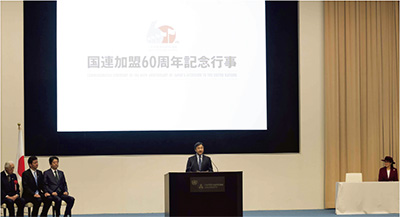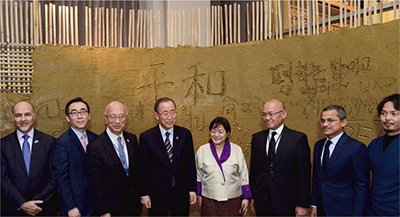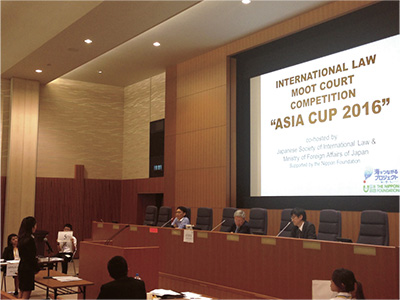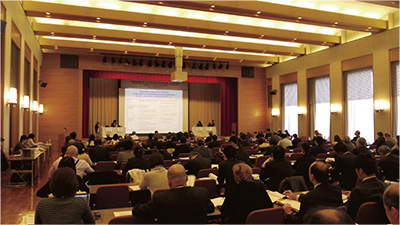Diplomatic Bluebook 2017
Chapter 3
Japan's Foreign Policy to Promote National and Worldwide Interests
6.The Rule of Law in the International Community
(1) Strengthening of the Rule of Law for the Diplomacy of Japan
Japan regards efforts to strengthen the rule of law as one of the pillars of its foreign policy. It opposes unilateral attempts to change the status quo by coercion and strives to maintain its territorial integrity, secure its maritime and economic rights and interests, and protect its citizens. For example, Japan raises the “Three Principles of the Rule of Law at Sea,” advocated by Prime Minister Abe, at various opportunities including international conferences such as the UN General Assembly, and undertakes initiatives to promote the rule of law in the international community. At the G7 Ise-Shima Summit held in May, the “Three Principles” were supported by G7 leaders and resulted in the shared recognition among the G7 countries. From the perspective of promoting the rule of law in the international community, Japan continues to contribute to the peaceful settlement of disputes between states based on international law, formation and development of a new order of international law, and the development of legal systems and human resources in various countries.
A Peaceful Settlement of Disputes
In order to encourage the peaceful settlement of disputes via international judicial institutions while striving to comply faithfully with international law, Japan accepts the compulsory jurisdiction of the International Court of Justice (ICJ), which is the principal judicial organ of the United Nations40, and cooperates with international courts and tribunals in various ways, including through provision of human and financial resources. Notably, those currently in service include Judge Hisashi Owada at the International Court of Justice (ICJ), President of the ICJ from March 2009 to February 2012, Judge Shunji Yanai at the International Tribunal for the Law of the Sea (ITLOS; see 3-1-6 (2)), President of the ITLOS from October 2011 to September 2014, and Judge Kuniko Ozaki at the International Criminal Court (ICC; see 3-1-6 (5)), Second Vice-President of the Court from March 2015 to February 2018. In addition, Japan is the largest financial contributor to the ITLOS and the ICC. Through these contributions, Japan is striving to improve the effectiveness and universality of international courts and tribunals. To further strengthen the structure of the Ministry in dealing with international litigations, efforts are ongoing to foster greater expertise on judicial proceedings at the Ministry and especially by the International Judicial Proceedings Division which was established in the International Legal Affairs Bureau of the Ministry of Foreign Affairs in April 2015.
- 40 A declaration that states parties to the Statute of the ICJ recognizes as compulsory ipso facto and without special agreement, in relation to any other state accepting the same obligation, the jurisdiction of the ICJ, in accordance with Article 36, paragraph 2 of its Statute. Only 72 countries including Japan have deposited such a declaration to date.
The year 2016 represents a major milestone, marking the 60th anniversary of Japan's accession to the United Nations. Taking this opportunity, many events associated with the UN were held in Japan and abroad. Throughout the year, the Ministry of Foreign Affairs worked together with relevant organizations to conduct lectures and hold photography exhibitions in various locations, as well as to organize a nationwide “UN Wall Newspaper” contest for elementary and junior high school students, and a video message competition entitled “The Future of Japan and the UN.” These events and activities drew many visitors and participants.
On December 19, the Commemorative Ceremony of the 60th Anniversary of Japan's Accession to the United Nations, organized jointly by the Ministry of Foreign Affairs and the United Nations Association of Japan, was held at the United Nations University in Tokyo. The event was graced by the presence of Their Imperial Highnesses the Crown Prince and Crown Princess .
In his opening remarks, State Minister for Foreign Affairs Kishi reflected on the 60 years of history of Japan in the UN, and pointed out that Japan, which made a fresh start as a peace-loving nation after World War II, has consistently attached great importance to UN diplomacy. He also stated that Japan will continue to play an active role in the areas that form the three pillars of the UN's activities—namely peace and security, development, and human rights.
His Imperial Highness the Crown Prince touched on his role and activities as the Honorary President of the United Nations Secretary-Generals' Advisory Board on Water and Sanitation (UNSGAB), and explained that the UN has continued to work tirelessly toward solving various problems in his opening address. His Imperial Highness the Crown Prince also spoke about the growing importance of the UN in tackling issues confronting the international community.
Prime Minister Abe spoke about Japan's efforts in the areas of peace, refugees, and development in his congratulatory address. He explained that Japan has established the vision of “Proactive Contribution to Peace” based on the principle of international cooperation, and described Japan's resolve to contribute even more actively than before in areas such as PKO and “Human Security.” He also declared Japan's commitment toward realizing the reform of the UN Security Council, and toward further fulfilling its duties as a permanent member of the Council.
The Commemorative Ceremony included a keynote speech and a panel discussion by experts, a panel session with UN Goodwill Ambassadors and representative of the Global Compact Network Japan, as well as a presentation contest by high school and university students who had been involved in the activities of Japan Model United Nations. Lively discussions concerning the future of Japan and the UN were held.
In April, a commemorative concert by Fuzjko Hemming, organized by the Permanent Mission of Japan to the United Nations and the Fuzjko Hemming Office, was held at the UN Headquarters in New York. In December, the Permanent Mission of Japan to the United Nations invited Master Plasterer Naoki Kusumi to conduct a wall-making demonstration and other activities as a part of “Compassion for the Earth” a commemorative event for the 60th anniversary of Japan's accession to the UN. In his congratulatory address, UN Secretary-General Ban Ki-moon, who had graced the event, expressed his gratitude for Japan's contribution to the UN in the 60 years since its accession. He expressed that peace is the foundation for all hopes and dreams, and inscribed the Japanese characters for “peace (平和)” in the wall. Ambassador Koro Bessho, Permanent Representative of Japan to the United Nations, spoke about the contributions that the Government of Japan has made to the three pillars of the UN —peace and security, development, and human rights—, and inscribed the Japanese character for “faith (信)” from the word “trust” in the wall.
In the General Debate at the UN General Assembly held in September 2016, Prime Minister Abe expressed that Japan will spare no effort in strengthening the UN in the next 60 years to come, as it did over the past 60 years. Taking the opportunity of this 60th Anniversary, Japan will continue to reinforce its international contribution through the UN more actively than ever.
 His Imperial Highness the Crown Prince speaking at the Commemorative Ceremony of the 60th Anniversary of Japan’s Accession to the United Nations
His Imperial Highness the Crown Prince speaking at the Commemorative Ceremony of the 60th Anniversary of Japan’s Accession to the United NationsAttendees from right: Prime Minister Abe, State Minister for Foreign Affairs Kishi, and Dr. Genshitsu Sen, President of the United Nations Association of Japan (December 19, Tokyo (United Nations University))
 UN Secretary-General Ban Ki-moon (fifth from right) and Ambassador Bessho, Permanent Representative of Japan to the United Nations (sixth from right) who inscribed messages in the wall created by Master Plasterer Kusumi (far right), as well as the Permanent Representatives of respective countries of the United Nations (December 19, New York, U.S. (UN Headquarters))
UN Secretary-General Ban Ki-moon (fifth from right) and Ambassador Bessho, Permanent Representative of Japan to the United Nations (sixth from right) who inscribed messages in the wall created by Master Plasterer Kusumi (far right), as well as the Permanent Representatives of respective countries of the United Nations (December 19, New York, U.S. (UN Headquarters))B International Rule-making
International rule-making that responds to issues the global community faces is one of the important efforts to strengthen the rule of law. In developing these international rules Japan has participated actively in negotiations in the respective individual fields and taken the initiative in rule-making processes since the planning phase, in order to reflect Japan's own principles and opinions in cross-sectoral initiatives in the UN, etc., and ensure the appropriate development of international laws. Specifically, Japan has been actively involved in the rule-making process within various international frameworks including the codification work being undertaken by the International Law Commission (ILC) and the 6th Committee of the United Nations General Assembly, as well as the preparation of conventions and model laws in the field of private international law at forums such as the Hague Conference on Private International Law (HCCH), the United Nations Commission on International Trade Law (UNCITRAL), and the International Institute for the Unification of Private Law (UNIDROIT). During the election of the ILC in November 2016, Dr. Shinya Murase, professor emeritus of Sophia University, was re-elected. He has been serving in the ILC as Special Rapporteur on the topic of “Protection of the Atmosphere” since 2014 and has contributed greatly to the ILC's codification work. Japan also dispatches government representatives to various meetings of the HCCH and UNCITRAL, taking an active lead in discussions. Professor Hideki Kanda from Gakushuin University serves as a board member of UNIDROIT. Japan also cooperates with the Asian-African Legal Consultative Organization (AALCO), a regional forum on international law, by providing personnel and financial support.
C Domestic legislation and other matters
Not only does Japan take steps to appropriately improve its own national laws so as to comply with international law, but it also actively supports the development of legislation of Asian countries and undertakes international cooperation related to the rule of law in order to further develop the rule of law. For example, the Ministry of Foreign Affairs and the Japanese Society of International Law, supported by the Nippon Foundation, co-organize the “Asia Cup,” an international law moot court competition for students from Asia (including Japan) with the aim of raising awareness about the importance of the peaceful settlement of disputes, nurturing future generations in the field of international law, and strengthening exchange and communication among them. In 2016, university students from 11 countries in Asia (Japan, India, Indonesia, Singapore, the ROK, Thailand, China, Nepal, the Philippines, Vietnam, and Malaysia) competed in written and oral pleadings on the theme of “The Sea.”
With respect to Japan's international judicial cooperation including capacity building in the area of criminal justice, Japan played an active part in presenting its contribution at events held on the sidelines of the AALCO Annual Session and the 6th Tokyo International Conference on African Development (TICAD VI).
 International Law Moot Court Competition “Asia Cup 2016” (August; Ministry of Foreign Affairs, Tokyo, Photo: Secretariat of Asia Cup Organizing Committee)
International Law Moot Court Competition “Asia Cup 2016” (August; Ministry of Foreign Affairs, Tokyo, Photo: Secretariat of Asia Cup Organizing Committee)(2) Initiatives in the Maritime Sector
In recent years, there has been an increasing number of cases of international friction and tension taking place in the seas of Asia, attracting significant concern from international society. Against this backdrop, Prime Minister Abe advocated the “Three Principles of the Rule of Law at Sea” at the Shangri-La Dialogue in May 2014, which are (1) making and clarifying claims based on international law; (2) not using force or coercion in trying to drive their claims; and (3) seeking to settle disputes by peaceful means. Japan has raised the “Three Principles” at various fora, including international conferences. At the G7 Ise-Shima Summit held in May 2016, the “Three Principles” were supported by G7 leaders and resulted in the shared recognition among the G7 countries. At the G7 Foreign Ministers' Meeting held in September during the UN General Assembly, the G7 Foreign Ministers shared the view that they remained concerned about the situation in the East China and South China Seas and reconfirmed the G7's position of emphasizing the rule of law. They also shared the view that the G7 will continue to work together to thoroughly ensure the rule of law.
 International Symposium on the Law of the Sea (February 16 and 17; Mita Kaigisho, Tokyo)
International Symposium on the Law of the Sea (February 16 and 17; Mita Kaigisho, Tokyo)The UN Convention on the Law of the Sea (UNCLOS) plays an important role in the rule of law at sea. UNCLOS established the International Tribunal for the Law of the Sea (ITLOS) for the peaceful settlement of maritime disputes and maintenance and development of the legal order at sea. Japan, promoting the rule of law at sea, attaches importance to the role played by ITLOS. Japan has provided personnel to the Tribunal by producing two Japanese judges successively and has also been the largest financial contributor since the establishment of ITLOS which celebrated its 20th anniversary in 2016.
Likewise, the Commission on the Limits of the Continental Shelf (CLCS) and the International Seabed Authority (ISA) also play important roles in the operation of the system for defining the outer limits of a continental shelf, and management of deep sea-bed mineral resources. Japan continues to cooperate with these organizations in both the human and financial resources (see 3-1-3 (4)).
Aiming to foster common understanding about the rule of law at sea among states, the Ministry of Foreign Affairs held the 2nd International Symposium on the Law of the Sea in February 2016, following on from the symposium held in the previous year. Against the backdrop of heightened interest of the international community in the development of marine resources and accompanied by factors such as technological progress, this symposium was held under the theme of “International Law for the Resources of the Sea: Scientific Advances, Preservation of Environment, Equity in Benefit Sharing.” Vigorous discussions were held among experts from Japan and abroad on various international legal issues related to deep seabed mineral resources, the continental shelf resources, and the marine biodiversity in areas outside the national jurisdiction area.
(3) Initiatives in the fields of politics and security
It remains vital to ensure the smooth and effective operation of the Japan-U.S. Security Treaty in order to bolster the foundations of Japan's foreign policy and security. In January 2016, Japan signed the New Special Measures Agreement (Agreement between Japan and the United States of America concerning New Special Measures regarding Facilities and Areas and the Status of United States Armed Forces in Japan), and this agreement entered into force in April, the same year with the approval of the Diet. In September 2016, Japan signed the Japan-U.S. Acquisition and Cross-Servicing Agreement (ACSA) to enable the application of the same framework of settlement procedures, etc., as under the previous agreement, with respect to the provision of goods and services made possible by the Legislation for Peace and Security (see 3-1-2).
In efforts to more proactively promote international cooperation in the field of security as well, Japan has engaged in negotiations on agreements concerning the transfer of defense equipment and technology. In February 2016, the agreement with the Philippines was signed.
Japan also continues to undertake negotiations towards the conclusion of a peace treaty with Russia, which is a key issue.
In addition, Japan has been working on establishing a legal framework for information security that may serve as an improved foundation for the sharing of classified information related to the interest of national security with relevant countries. Following the U.S., NATO, France, Australia, UK, and India, Japan signed the agreement on the Security of Information with Italy when Foreign Minister Kishida visited Italy in March 2016. In November the same year, Japan also signed the agreement on the Protection of Classified Military Information with the ROK.
In the field of nuclear energy, among the ongoing negotiations of bilateral nuclear cooperation agreements, Japan signed the agreement with India in November 2016 when Prime Minister Modi of India visited Japan.
(4) Initiatives in the fields of the economy and society
The conclusion and implementation of international agreements that bring legal discipline to cooperative relationships with other countries in the economic sphere is becoming increasingly important in order to promote the liberalization of trade and investment, as well as people-to-people exchanges, and to strengthen the foundations for the overseas activities of Japanese citizens and companies. The agreements that Japan signed or concluded with various countries and regions in 2016 include tax conventions, investment treaties, social security agreements, and air services agreements. Japan also worked on negotiations with the Asia-Pacific region and Europe for Economic Partnership Agreements (EPAs), actively promoting negotiations on broader regional economic partnership such as the Free Trade Agreement (FTA) among Japan, China, and the ROK, the Regional Comprehensive Economic Partnership (RCEP) and the Japan-EU EPA. Regarding the Trans-Pacific Partnership (TPP) Agreement, the conclusion of the agreement was approved by the Diet in December. In the field of bilateral EPAs, the EPA between Japan and Mongolia entered into force in June.
In the field of intellectual property protection, the Patent Law Treaty and the Singapore Treaty on the Law of Trademarks entered into force in Japan in June. With a view of protecting and enhancing the livelihoods and activities of Japanese citizens and companies, Japan is working on the appropriate implementation of existing international agreements as well as utilizing the dispute settlement system of the WTO.
In social fields such as human rights, fisheries, maritime affairs, aviation, labor and social security, which are closely linked with the livelihoods of the people, Japan is actively participating in negotiations to ensure that Japan's stance is reflected in international agreements. In addition, in the field of environment and climate change, the Minamata Convention on Mercury was concluded in February, while the Paris Agreement in the field of climate change was concluded in November.
(5) Initiatives in the field of criminal justice
The ICC is the first-ever permanent international criminal court for prosecuting and sentencing individuals who have committed the most serious crimes of concern to the international community in accordance with international law. Since becoming a State Party to the ICC Rome Statute in October 2007, Japan has consistently cooperated with the ICC's activities in various ways. Financially, Japan is the largest contributor to the ICC, accounting for approximately 16.5% of the entire contributions to the Court as of 2016. In regards to human resources, Japan has consistently produced judges since its accession to the ICC (Judge Kuniko Ozaki currently in service). Furthermore, Mr. Motoo Noguchi, Member of the Board of the Directors of the Trust Fund for Victims (TFV), was re-elected as the Chair of the Board in April 2016, while Mr. Hiroshi Fukuda continued to serve as Member of the Advisory Committee on Nominations of Judges (ACN). These developments demonstrate Japan's active cooperation for the activities of the ICC. As the ICC evolves as a full-fledged international criminal justice institution, it is imperative to secure cooperation with the ICC, establish the principle of complementarity, and to ensure the efficiency and effectiveness of its judicial procedures. Through the Assembly of States Parties, Japan engages in addressing these challenges, including by serving as Co-chair for the Study Group on Governance and Focal Point on for non-cooperation issues.
In addition to those efforts related to the ICC, in the face of an increase in cross-border crime in recent years, Japan is further working on ensuring the submission of required proof from other countries. Japan is also proactive in improving legal frameworks for promoting international cooperation in the field of criminal justice. Japan has been working on negotiations toward concluding such international agreements as the Treaty on Mutual Legal Assistance in Criminal Matters (MLAT)41, the Treaty on Extradition42, and the Treaty on the Transfer of Sentenced Persons43.
- 41 The legal framework that allows more efficient and prompt cooperation with authorities of other countries in the aspects of criminal investigation and procedures.
- 42 A legal framework having comprehensive and detailed provisions regarding the extradition of criminals to enable more effective cooperation for repressing crime.
- 43 A legal framework aiming to facilitate the social rehabilitation of foreign prisoners by giving them the possibility of serving their sentences in their own countries.

